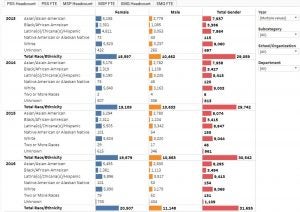Dear Bruin Community:
At UCLA, our people are our strength. We know that our academic mission is best achieved when it upholds UCLA’s commitment to our values of diversity, inclusion and equity for all. Together, these values create conditions in which all people can thrive. As we enter a new year and a new quarter, we call upon students, staff, faculty, and administrators to recommit ourselves to treating one another in ways that uphold our humanity and create a culture in which academic and human achievement can become its best.
Providing a world-class education requires critical engagement with difficult periods of history and areas of knowledge. We underscore the importance of freedom of speech and academic freedom in advancing learning. We also underscore the need for all faculty to ensure that courses and classroom spaces are supportive, inclusive and free from discrimination and harassment. Teaching and learning require mutual respect and shared accountability, with students and faculty having a good understanding of their respective rights and responsibilities.
At times, difficult situations arise when it is less evident how to respond to an uncomfortable or unfamiliar situation. One example concerns a professor’s or instructor’s choice to cover material from a historical period that is a source of past and continuing harm, or to assign content that includes pejorative terms used to oppress and discriminate against certain peoples. Academic freedom protects freedom of inquiry and research, freedom of teaching, and freedom of expression and publication, all central to the fundamental mission of the University (APM 010 (PDF)). We also recognize that certain material and teaching practices can cause negative impacts for students, affecting their well-being and ability to learn. Students have rights and recourses in these situations as well, such as the right to respectfully remove oneself from a classroom setting if it is causing significant harm or distress. Comprehensive resources to support students and faculty, to help them to both prevent and navigate difficult circumstances are available on the UCLA EDI website.
To guide all of us on this journey, students and faculty have codes of conduct that enhance our pursuit of academic excellence by specifying our rights and responsibilities. Recourse for alleged violations of these codes is provided by the UCLA Academic Senate, the UCLA EDI-Civil Rights Office, and the Office of Student Conduct in the UCLA Office of the Dean of Students. All members of the UCLA community commit to the Statement of Ethical Values. The university also promotes Principles of Community, “where diversity is critical to maintaining excellence in all our endeavors.” Policy is supplemented and enhanced by the Regents’ Principles Against Intolerance as well as initiatives for Inclusive Teaching in Diverse Classrooms. We encourage students, staff, faculty and administrators to read and to reflect on these key documents—and to recommit to abiding by their precepts.
If you have questions about equity, diversity and inclusion resources, please contact the Office of Equity, Diversity and Inclusion at WeListen@equity.ucla.edu.
If you have questions about faculty rights and responsibilities, please contact the Academic Senate at senateoffice@senate.ucla.edu.
We are guided by aspirational statements, policies, rules and processes, but these are just the guardrails. As individual members of the UCLA community, we are each responsible for upholding a culture of inclusion and respect in the classroom. Being reflective and looking at complex or divisive issues through the eyes of others enriches our teaching and learning, our scholarship and our lives. It is how we create a more just and equitable world.
Sincerely,
Shane N. White
Chair, UCLA Academic Senate
Anna Spain Bradley
UCLA Vice Chancellor for Equity, Diversity and Inclusion






